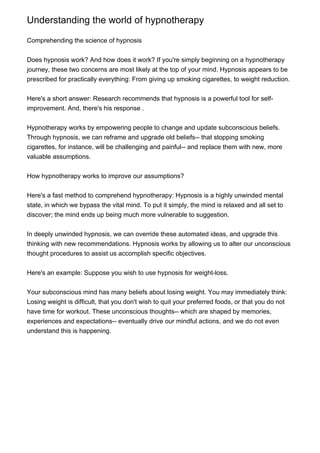
Understanding the world of hypnotherapy
- 1. Understanding the world of hypnotherapy Comprehending the science of hypnosis Does hypnosis work? And how does it work? If you're simply beginning on a hypnotherapy journey, these two concerns are most likely at the top of your mind. Hypnosis appears to be prescribed for practically everything: From giving up smoking cigarettes, to weight reduction. Here's a short answer: Research recommends that hypnosis is a powerful tool for self- improvement. And, there's his response . Hypnotherapy works by empowering people to change and update subconscious beliefs. Through hypnosis, we can reframe and upgrade old beliefs-- that stopping smoking cigarettes, for instance, will be challenging and painful-- and replace them with new, more valuable assumptions. How hypnotherapy works to improve our assumptions? Here's a fast method to comprehend hypnotherapy: Hypnosis is a highly unwinded mental state, in which we bypass the vital mind. To put it simply, the mind is relaxed and all set to discover; the mind ends up being much more vulnerable to suggestion. In deeply unwinded hypnosis, we can override these automated ideas, and upgrade this thinking with new recommendations. Hypnosis works by allowing us to alter our unconscious thought procedures to assist us accomplish specific objectives. Here's an example: Suppose you wish to use hypnosis for weight-loss. Your subconscious mind has many beliefs about losing weight. You may immediately think: Losing weight is difficult, that you don't wish to quit your preferred foods, or that you do not have time for workout. These unconscious thoughts-- which are shaped by memories, experiences and expectations-- eventually drive our mindful actions, and we do not even understand this is happening.
- 3. In brief, our subconscious sets us as much as fail. And that's true about a number of our bad practices-- negative self-talk, cigarette smoking, overeating-- they're all deeply rooted in unconscious idea. Through hypnotherapy, though, we can begin to modify and upgrade these unfavorable presumptions. And that may explain why the research study strongly suggests hypnosis works for conditions like chronic pain, substance abuse and weight-loss. By training our minds to believe in a different way about obstacles and goals, we can get rid of the negative ideas that so regularly result in self-sabotage. Simply mentioned, https://www.mayoclinic.org/tests-procedures/hypnosis/about/pac- 20394405 empowers you to change your unconscious thoughts. And that, in a nutshell, is how hypnotherapy works But we're going to dive a little much deeper-- and reveal you why individuals think the mind is so suggestible under hypnosis, as well as why our subconscious presumptions are so powerful. Thinking about how hypnotherapy functions Hypnosis has interested us for centuries. In truth, starting in the 1770s an Austrian physician named Frances Mesmer-- for whom the verb mesmerize is called-- first explored with putting patients into a trance-like state. Mesmer would play ethereal music, dim the lights, and utilize relaxation techniques. But Mesmer had some eccentric ideas about what was happening while in trance, i.e. that he was instilling clients with undetectable magnetic fluids. Even though Mesmer was incorrect in his presumptions, he did spark our cumulative interest in the field of hypnosis Today, there are 2 primary schools of thought regarding what's going on in the mind while in a state of hypnosis The State Theory of hypnotherapy The state theory proposes that subjects under hypnosis enter an altered state of consciousness. In this modified state, subjects can disassociate behavioral control from awareness. Subjects can bypass important conscious thoughts, and focus on what they're doing without asking why. In an early hypnosis experiment, for example, Ernst Hilgard had topics hold their hands in a pail of cold water. Compared to non-hypnotized topics, those under hypnosis were able to hold their hands in the water for much longer; but ultimately, once the discomfort became
- 4. undue, they exited the trance state and eliminated their hands. What Hilgard's experiment showed is that while under hypnosis, the patients were able to bypass that important thought-- "this water is cold." And that's what the state theory proposes: That we reach a state of deep relaxation, when typical brain procedures are changed. The Non-State Theory of hypnotism The non-state theory, on the other hand, suggests that hypnotized topics are playing the role of an individual under hypnosis. We have specific conclusions and presumptions of how we're expected to act in this role, which influences our behavior throughout and after a hypnotherapy session. For that reason, positive responses to hypnosis are formed since that's how topics expect or presume they need to act afterwards.